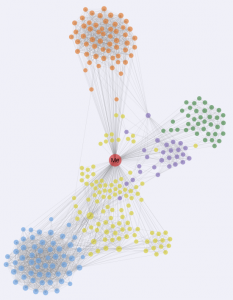Long ago, in the early years of Facebook’s rise to power, it became apparent that it had another key feature alongside feeds and wall posts – the friends list. Not only was it a good way to keep in touch with friends after University, it also became a good way of declaring who those friends were. This aspect was emphasized more and more as the site’s user base increased; you could now keep a quite exhaustive catalogue of who you knew. There were even apps on Facebook’s fledgling platform that allowed to to map those friends, and see interesting groups and connections form.
My Facebook Friends Graph
For a shameless nerd such as myself, this is great stuff – I love having a neatly curated index of almost everyone I know, particularly one with which I generate pretty visualisations. This one here shows a nice distinction between people I went to school with (orange), university (blue), people I work with (green), DDRFUKers (purple), and a great interconnected yellow mass of Soton Kiddies, LARPers, neighbours and post-University friends.
But however nice it might be to see this in pictorial form, I know this information. All of it is in my head; each different group and the few people that make the links between them. There’s no need to record this data to help me.
Of course, I need to record this data in order to talk to these people and share status updates on Facebook. But I barely interact with anyone I went to school with. At work, a mention of something I posted on Facebook tends to be embarrassing. Most of the dots marked yellow or purple are people who are on Twitter, and who I would prefer to talk to there.
So for whom am I updating, and publishing, what has become known as my “Social Graph”? I have already established that although I curated my Social Graph out of an egotistic and nerdy desire to catalogue everything, it serves no purpose for me. Presumably, then, I am doing it for the benefit of Facebook and its advertisers who can use it to add cruel hooks into friends’ feeds. “Hey, 24 of your friends play this!” “Ian R likes some guy’s band!”
At best, “unfriending” on Facebook seems like something that is done by spurned teenage girls complaining about how much of a bitch their ex-“BFF” turned out to be. At worst, it seems like an outright denial that you have ever known a person. But what benefit does a user get from declaring themselves “friends” with someone they’ve said not a single word to in ten years?
If, as I have previously bemoaned, I still don’t want to quit Facebook entirely, then I fear a Great Unfriending may be nigh.

Add a Comment